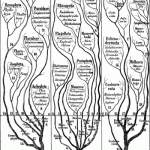Public Lecture presented by Professor Stephen Donnellan Some of the big questions in evolution of life on earth, such as how did life begin, why did sex evolve, how do species form, are starting to be unravelled by the availability of … Continue reading →
This conference is a major event in the 2013 ANU special year on nonlinear partial differential equations. We focus on new developments in several themes of nonlinear PDEs and their applications, which include variational theory of nonlinear equations arising in … Continue reading →
Ever since the publication of Origin of the Species, biologists have aimed to uncover the evolutionary history of the species that inhabit (or once inhabited) the Earth – this project has come to be known as the Tree of Life. … Continue reading →
Phylogenetics is concerned with the problem of reconstructing the past evolutionary history of organisms from molecular data, such as DNA, or morphological characters. There is ongoing interest in the further development of the mathematics that underlies computational phylogenetic methods. Hidden … Continue reading →
IIASA’s annual 3-month Young Scientists Summer Program (YSSP) offers research opportunities to talented young researchers whose interests correspond with IIASA’s ongoing research on issues of global environmental, economic and social change. From June through August accepted participants work within the … Continue reading →
The thematic program “Mathematical Biology” will be held in Lyon from March 4th to June 14th, 2013. The main topics to be addressed in this program are: cell biology, population dynamics, quantitative modeling for drug development, systems biology, and evolutionary … Continue reading →
The main topics to be highlighted during the workshop are mathematical models for evolutionary biology (deterministic models and stochastic processes) adaptive dynamics modeling of invasive species Recent progresses have been made in the modeling of biological invasions and evolution, from … Continue reading →
Coalescent theory is one of the most elegant and powerful probabilistic approaches in mathematical population genetics. It formalizes the backward perspective on evolution in large finite populations by considering a population evolving forward in time under the effects of various … Continue reading →
Models of evolution of biological sequences have gone a long way since Jukes and Cantor. First, it is no longer acceptable to consider that mutations of a given type occur independently and uniformIy across time and space. A large number … Continue reading →
One of the most compelling images to result from Darwin’s theory of evolution is that of the tree of life. Inherent in this picture is the idea that when members of a species are geographically separated, over time they may … Continue reading →




